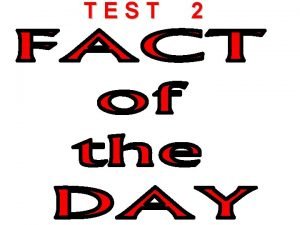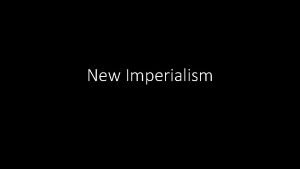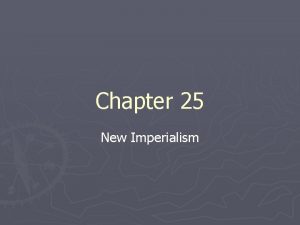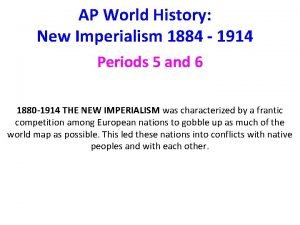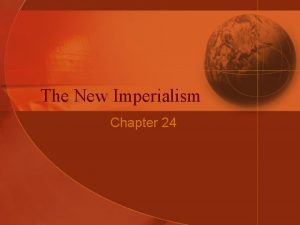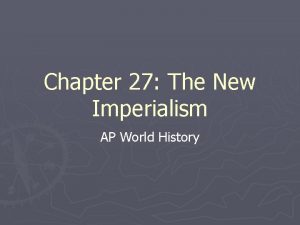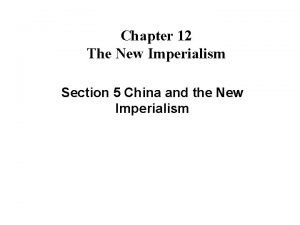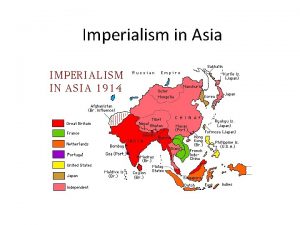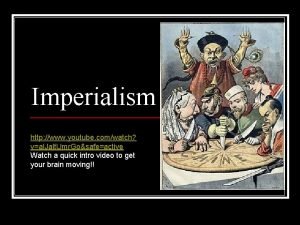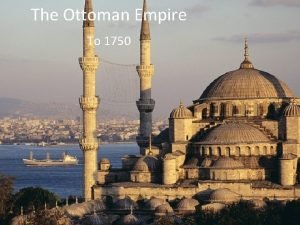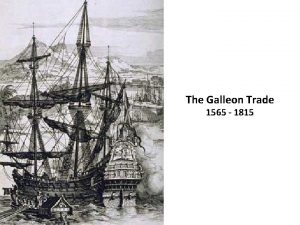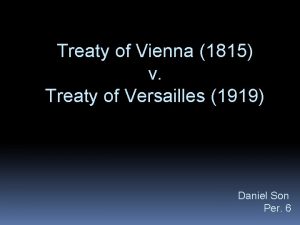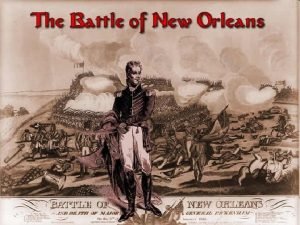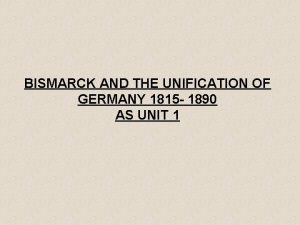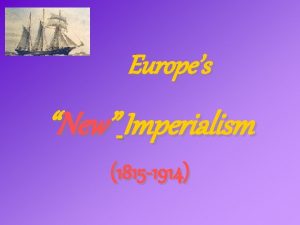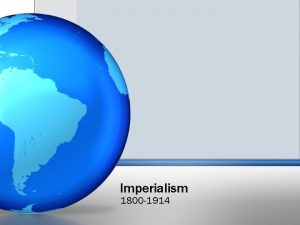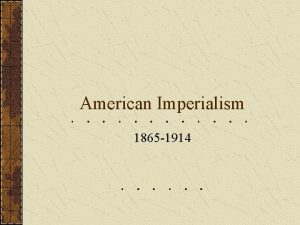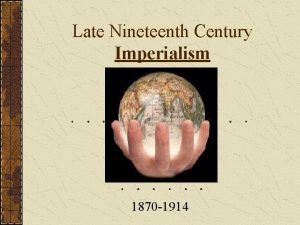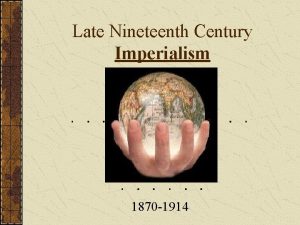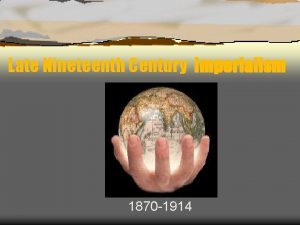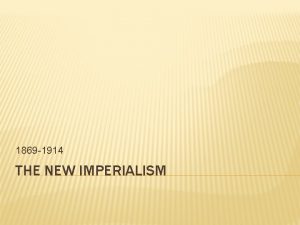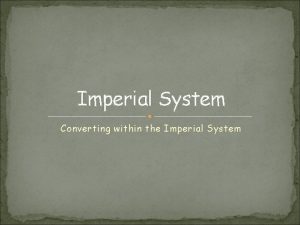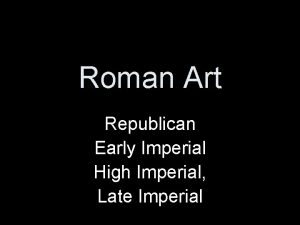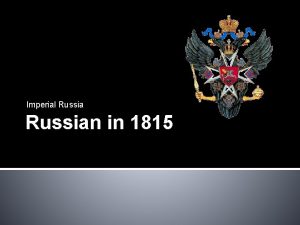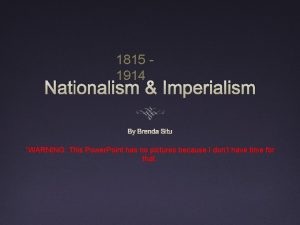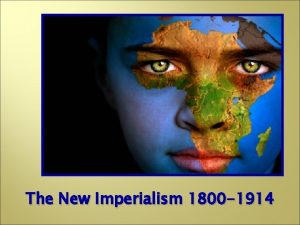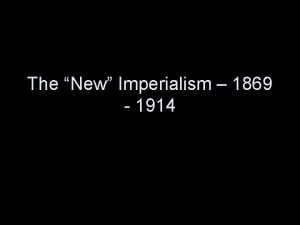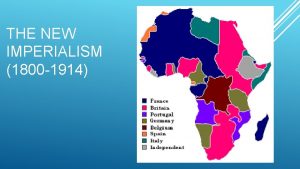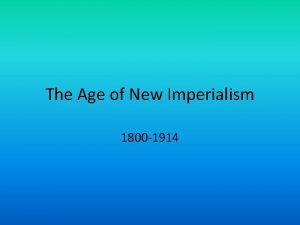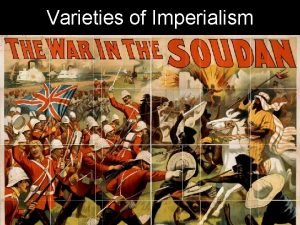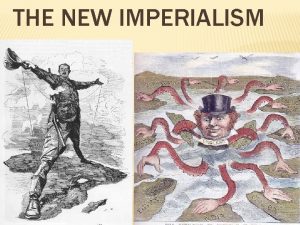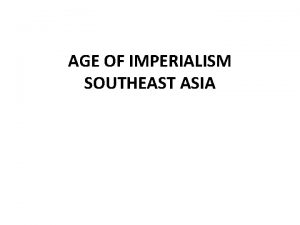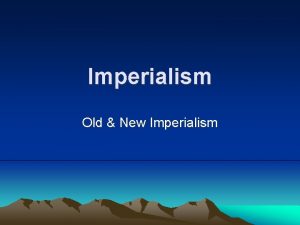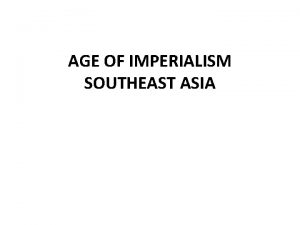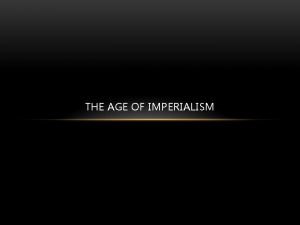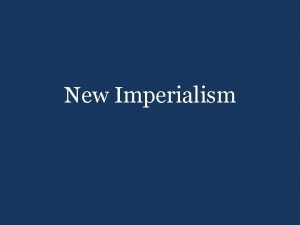THE IMPERIAL CENTURY 1815 1914 New Imperialism Late






























- Slides: 30

THE IMPERIAL CENTURY 1815 -1914

New Imperialism • Late 19 th Century – World War II • European Directed (+ US, Japan) • Motives: Nationalism, Industrialization, White Man’s Burden • Forms: Colonies, Protectorate, Spheres of Influence • Colonial Groups: Tropical Dependencies and Settlement Colonies • Areas Colonized: Asia & Southern Hemisphere plus Neo- Colonialism in Latin America • Roots of Contact: pre 1750: British in India & South Africa, French in Algeria & Indochina, Dutch in Indonesia • Regional Origins/Changes • Dark Continent: Stanley & Livingstone, Berlin Conference • China: Opium Wars • South Asia: Sepoy Mutiny

Extent of Colonialism (by 1939) **** Great Britain France Belgium Area in Square Miles 94, 000 212, 600 11, 800 Population 45, 500, 100 Area of Colonies 13, 100, 000 Netherlands Germany (1914) 13, 200 210, 000 42, 000 8, 300, 000 8. 500, 000 67, 500, 000 4, 300, 000 940, 000 790, 000 1, 100, 000 Population of Colonies 470, 000 65, 000 13, 000 66, 000 13, 000

Percentage of Territories Belonging to the European/US Colonial Powers 1900 Region Africa Polynesia Australia Americas Percentage Controlled 90. 4% 98. 9% 56. 5% 100. 0% 27. 2%

South Africa 1500 - Portugal : Diaz & De Gama 1650 - Dutch: Dutch East India Company Boers settlers moved inland 1815 - British Annexed Great trek of Boers inland Zulu Wars Anglo-Boer Wars 1910 – Union of South Africa Legacy of Apartheid

Cecil Rhodes Capetown to Cairo "I contend that we are the first race in the world and that the more of the world we inhabit the better it is for the human race. "

North Africa: Ottoman Territories • Egypt : khedive (Muhammed Ali) • 1882 Egyptian revolt • Incurred debts, combined French and British bombing of Alexandria • British presence in Cabinet- Protectorate status • Algeria: Pasha (Barbary Pirates) • French invasion 1830 • Continued involvement & settlement • Libya -Italian invasion 1911 (Italo-Turkish)

Suez Canal • The Highway to India • 120 miles long • Built by the French –opened 1869 • Controlling shares held by French investors • Under ‘British protection’ 1882 • Nationalized by Nasser 1956

Fashoda Crisis, 1898 • British & French stand- off • Both wanted to extend control of territories in North Africa • French relinquished claims quietly and withdrew forces

Burundi 1871

Berlin Conference (1884) • Chancellor Otto von Bismarck “the honest broker” • 14 European powers established ground rules for the future exploitation of the "dark continent. “ • 80% was still under local African rule • Africans were not invited or made privy to their decisions.

Forms of Imperial Control • The French practiced direct rule: the goal was to impose French culture and turn their colonies into French provinces Benevolent Colonialism - in Madagascar the French instruct the Natives in horticultural techniques

Forms of Imperial Control • The British followed a system of indirect rule: using sultans, chiefs, or other local rulers to govern their colonies

The Belgium Congo Free State • The Butcher of Congo: King Leopold II • Horrific levels of violence • Production quotas


British Empire

The Sun Never Sets on the British Empire

British Jewel in the Imperial Crown : India • 1757: Battle of Plassey • British East India Company • 1857: Sepoy Mutiny • 1858: British Raj • 1876: Queen Victoria Empress of India • colonial rule until 1947

French Indochina • Origins late 17 th century • Trade, missionaries • 1840 s annexed parts of Vietnam • 1883 Vietnam becomes French Protectorate • Sino-French War • French victory paved the way for French control of remainder of Vietnam, Cambodia and Laos

Orange – Britain Purple – France Red – German Green – Japan Blue – Russian

East Asia: China • Opium Wars (Anglo-Chinese Wars) • 1839 -1842 • 1856 -1860 • Treaty of Nanjing (unequal treaties) • Eliminated Canton Laws which restricted contact and trade • Spheres of Influence • Imperial China's decline • Taiping Rebellion • Boxer Rebellion

Dutch Indonesia • 1609 VOC establish Batavia and begin to dominate the Spice trade • Involve themselves in local disputes and demand territory from winners • Building on administrative center at Batavia (Jakarta) they annex the entire archipelago • Dutch State rule in 1816 after the bankruptcy of the VOC • Profits in rubber, oil, tin, tobacco, sugar, coffee, and tea • High levels of violence and cruelty • Java War 1825 -1830 • Cultivation System • 1/5 of land to the production of cash crops • Indentured servitude • Liberal and Ethical period follow after 1870 but doesn’t dissuade growth of a nationalist movement

The Pacific • Maoris of New Zealand • Alcoholism, disease, warfare • Introduction of Christianity and European farming • Maori resilience • Hawaii • Increasing Western influence from 18 th century onward • Voyages of Captain Cook • Unified leadership under Kameha • Adoption of Western practices and opening to more Western merchants; Christianity • Settler pattern developed; sugar plantations; Asian labor

IMPACT – LONG TERM On Europe… On the world…

European Hegemony • 1800: Western powers held 35% of the earth’s surface • 1878: 67% of the earth’s surface • 1914: 85% of the earth’s surface • Britain gained 66 million new subjects between 1880 -1900 • France, 26 million new subjects • Germany, 13 million new subjects • Economic Impact?

Colonial Influence on Europeans • Adopted to varying degrees the dress, eating and work habits, and styles of Asian peoples they ruled. • Failure of Little Holland in Java • Looser-fitting cotton-clothing • Asian cuisine • Indian hookahs • Afternoon lunch break (and siesta) • Asian women (brothels and marriage) • Such relationships became less common in the last of the 19 th century as social distance between colonizers and colonized occurred.

Reforms • India • 1770 Bengal famine • British East India Company made more accountable to British Parliament • 1790 s Lord Cornwallis reforms; helped with corruption but limited Indian participation • Evangelical calls for reform • Utilitarian support for reform • Pushed for British institutions such as English-language education • Tried to stop practice of sati • Dutch sponsored education reform in Indonesia • Only missionaries involved in education in Africa • Limited middle class/college graduates

Changing Relationships • By the late 19 th century more wives and families arrived • Increasing notions of “white racial supremacy”

Social Imperialism • Diffuse working-class discontent • Outlet for the unemployed • Improved standard of living at expense of colonial population • Highlighted raceconscious thinking Nationalistic rivalries • Diplomatic crises • Arms race • Thayer Mahan, Influence of Naval Power • WWI…

Colonial Revolts 1. 2. 3. 4. 5. 6. The Indian Revolt of 1857 The Boxer Rebellion The Ghost Dance The Xhosa Cattle. Killing Movement The Maji Rebellion (War) The Mau Rebellion • Please research your assigned revolt and be prepared to discuss • Background • Goals • Leadership • Events • Degree of Success • Overall Effects
 Frise chronologique 1815 à 1870
Frise chronologique 1815 à 1870 Old imperialism vs new imperialism chart
Old imperialism vs new imperialism chart Old imperialism motives
Old imperialism motives Imperialism map 1914
Imperialism map 1914 Horace taylor, the verdict, september 25, 1899
Horace taylor, the verdict, september 25, 1899 Objectiv font
Objectiv font New world of work badges
New world of work badges Marx on imperialism
Marx on imperialism New imperialism africa
New imperialism africa New imperialism africa
New imperialism africa World history
World history Chapter 24 section 5 china and the new imperialism
Chapter 24 section 5 china and the new imperialism New imperialism definition ap world history
New imperialism definition ap world history Chapter 12 section 5 china and the new imperialism
Chapter 12 section 5 china and the new imperialism Imperialism
Imperialism Economic causes of new imperialism
Economic causes of new imperialism Asia imperialism
Asia imperialism Causes of new imperialism
Causes of new imperialism Lesson 1: the new imperialism
Lesson 1: the new imperialism Ottoman empire 1750-1900
Ottoman empire 1750-1900 Galleon trade and mercantilism are synonymous
Galleon trade and mercantilism are synonymous Europa sfintei aliante
Europa sfintei aliante Treaty of vienna 1815
Treaty of vienna 1815 Reino sąjungos įkūrimas
Reino sąjungos įkūrimas Frise chronologique 1815 à 1870
Frise chronologique 1815 à 1870 In 1814 we took a little trip
In 1814 we took a little trip 1815
1815 Liberalism and nationalism in germany 1815-71
Liberalism and nationalism in germany 1815-71 Augusta ada king, countess of lovelace
Augusta ada king, countess of lovelace Ada lovelace family background
Ada lovelace family background Sdružení pro vydávání a šíření českých knih
Sdružení pro vydávání a šíření českých knih




